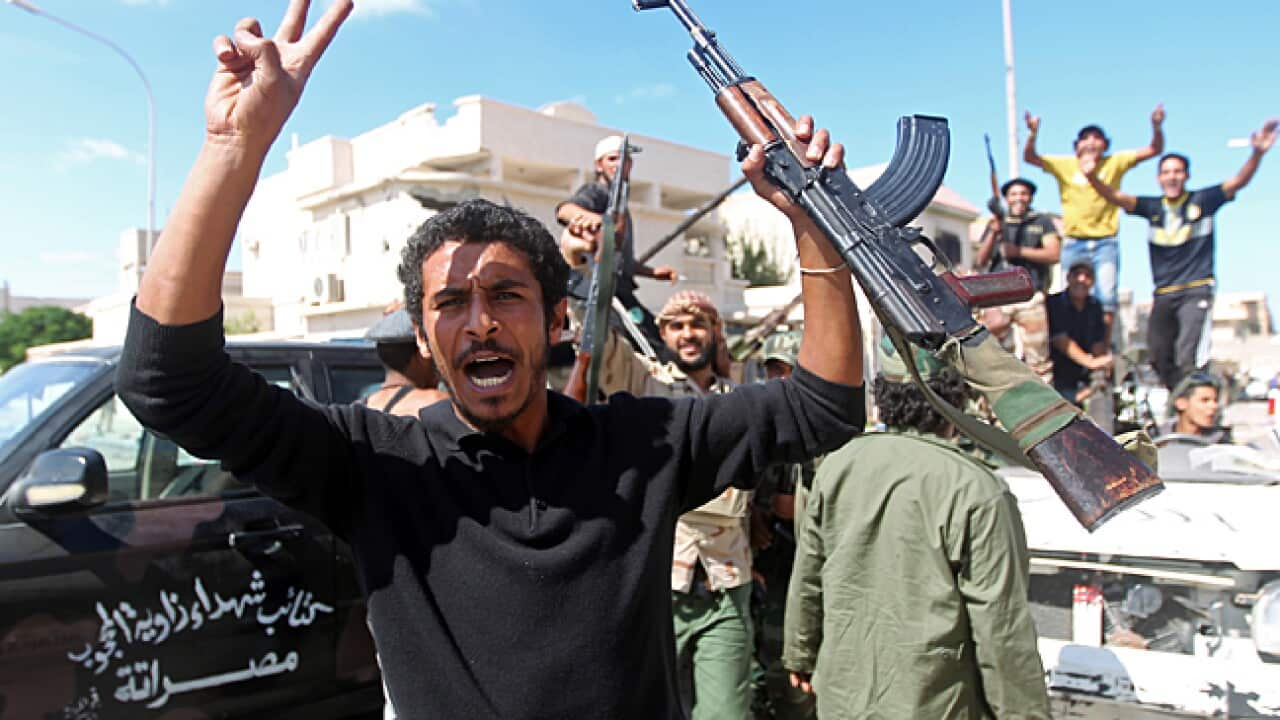As news broke last night of the death of Gaddafi, of his son Mutassim and other top regime figures during the fall of his hometown Sirte, the National Transitional Council held off on a promised declaration that the country was finally freed.
NTC leaders had said that once Sirte was in the hands of their fighters, they would announce the formation of an interim government to oversee the drawing up of a new constitution and the holding of free elections after the decades of dictatorship.
But with another Gaddafi son -- his longtime heir-apparent Seif al-Islam -- still unaccounted for in the routing of loyalist forces, NTC leaders waited, despite the scenes of jubilation in towns across the country at the news that the once-all powerful tyrant was dead.
Interim premier Mahmud Jibril said Seif al-Islam was believed to be pinned down in a village near Sirte.
Gaddafi's body was laid out overnight in a private residence in Misrata -- Libya's third-largest city, which his forces devastated in a protracted siege that proved to be one of the turning points of the eight-month uprising, an AFP correspondent reported.
NTC leaders were cagey about plans for his burial, not wishing to see his grave become a rallying point for residual loyalists.
Question marks remained about how he met his end -- mobile phone footage appeared to show him captured bloodied but still alive and then lynched by his captors.
But for Libyans whose rebellion had cost more than 25,000 lives, the demise of the hated dictator sparked a spontaneous outpouring of joy and celebratory gunfire.
And world governments led by Britain and France, which spearheaded the military intervention that helped propel the rebels to victory, hailed Gaddafi's death as marking the end of an era of dictatorship.
Foreign Secretary William Hague said Britain does not approve of "extrajudicial killing" but will not mourn Gaddafi, whom it held responsible for ordering the 1988 bombing of a US airliner over the Scottish town of Lockerbie as well as arming the Irish Republican Army in its deadly campaign of bombings.
"We would have liked him to face justice for his crimes in a court, in an international or Libyan court, and we don't approve of extrajudicial killing," Hague told Sky News.
"But we are not going to mourn him. There are so many thousands who have died in this conflict, and the end of the battle in Sirte and the death of Gaddafi does mark that big opportunity now for the Libyans to move on."
Libyan fighters said they cornered the man who regarded himself as "king of kings of Africa" cowering in a culvert brandishing a golden gun.
"Gaddafi was in a jeep when rebels opened fire on it. He got out and tried to flee, taking shelter in a sewage pipe," National Transitional Council (NTC) field commander Mohammed Leith told AFP.
NTC fighters "opened fire again and he came out carrying a Kalashnikov (assault rifle) in one hand and a pistol in the other," he said.
Gaddafi "looked left and right and asked what was happening. Rebels opened fire again, wounding his leg and shoulder. He died after that," according to Leith.
A wounded Gaddafi was seen alive and standing as he was being manhandled by Libya's new regime fighters before the announcement of his death, in mobile phone video footage obtained by AFP.
Bloodied in the head, face and shoulders, NTC fighters circled Gaddafi as he apparently tried to cry out.
One fighter appeared to hold a gun to his head but it was unclear if he fired before Gaddafi was hauled onto the front of a vehicle amid chaotic scenes.
Paris and Washington revealed that their aircraft had both intervened when a fugitive convoy, believed to be carrying Gaddafi, fled Sirte as NTC fighters, who had laid siege to the Mediterranean coastal city for two months, overran the last redoubt of loyalist forces.
A US defence official said a US Predator drone along with a French fighter jet had attacked a convoy of vehicles that Paris believed was carrying Muammar Gaddafi.
French Defence Minister Gerard Longuet had earlier revealed that a French Mirage-2000 fired a warning shot at a column of several dozen vehicles fleeing Sirte.
The US defence official, who spoke on condition of anonymity, said the unmanned Predator aircraft had struck "the same convoy" but could not confirm that Gaddafi was in one of the vehicles.
Longuet told reporters in Paris that the convoy "was stopped from progressing as it sought to flee Sirte but was not destroyed by the French intervention."
Libyan fighters then intervened, destroying the vehicles, from which "they took out Colonel Gaddafi," he added.
The air strikes marked the culmination of a NATO-led air war mandated by the United Nations to protect civilians from Kadahfi's forces that the alliance said would now wind down from Friday.
NATO chief Anders Fogh Rasmussen said an end to NATO's involvement in the oil-rich north African state "has now moved much closer".
The alliance's Supreme Allied Commander, Admiral James Stavridis, is due to issue a recommendation, "probably tomorrow (Friday), for the end of the operation", a NATO official said on Thursday.
French President Nicolas Sarkozy called on Libya's new rulers to hasten the promised transition to democracy following the confirmation of Gaddafi's death.
"The liberation of Sirte should mark, in accordance with commitments taken by the National Transitional Council, the start of the process accepted by the NTC to establish a democratic system in Libya in which all components of the country will have their place and in which fundamental freedoms will be guaranteed," he said.
He joined other leaders, including UN chief Ban Ki-moon in calling on the victorious NTC fighters to refrain from revenge attack against Gaddafi's defeated loyalists.
"A new page is turning for the Libyan people, one of reconciliation in unity and freedom," Sarkozy said.
"Now is the time for all Libyans to come together," said Ban.

